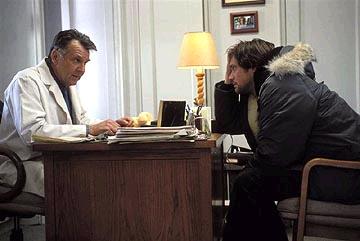

The beginning of Eternal Sunshine of the Spotless Mind is actually the end, but since auteur Charlie Kaufman is the author, this is no surprise. Kaufman has the unique ability write films that seem weird and clever at the same time. His strangest forays (Being John Malkovich and Adaptation) have been his best, while his more conventional outings (Human Nature and Confessions of a Dangerous Mind), "conventional" being relative, have been a little off the mark. Kaufman is back in fine form here, where, along with co-writers Michael Gondry (who also directed) and Pierre Bismuth craft a loopy story about erasing memories that is actually a meditation on love and loss. The fact that Kaufman can successfully mix such contradictory emotions for the duration of the film, and how he can make such a strange idea seem plausible shows how talented a writer he is.
The concept is that there is a company called Lacuna Inc., run by Dr. Howard Mierzwiak (Tom Wilkinson, Girl with a Pearl Earring, The Importance of Being Earnest) that specializes in selectively erasing memories. Clementine (Kate Winslet, The Life of David Gale, Iris) erased memories of her ex-boyfriend Joel (Jim Carrey, Bruce Almighty, The Majestic) after a particularly bad break-up, and Joel decides to do the same in retaliation. The bulk of Eternal Sunshine (which takes its name from an Alexander Pope poem) takes place inside Joel's mind, where he quickly decides that he doesn't want to go through with the erasure. As he slowly relives all of his memories with Clementine, he realizes that while many bad things did happen, there are plenty of good things that he still would like to remember.
So he begins a strange game of trying to outwit Mierzwiak's assistant Stan (Mark Ruffalo, In the Cut, My Life Without Me), who is monitoring the procedure next to an unconscious Joel. As Stan tries to delete specific memories from Joel's mind, Joel tries all that he can to prevent him from doing so, by changing them or rearranging them. Meanwhile, Stan's co-worker Patrick (Elijah Wood, The Return of the King, Spy Kids 3-D) has his sights on Clementine, and is using all of Joel's memories to try to get her to fall in love with him. The entire concept of the film is quite amusing, but Kaufman, by injecting a sense of loss into it, takes it to the next level. In his head, Joel has the chance to review his all his memories. He and Clementine are completely opposite in personality, but are perfect for each other. Her spontaneity (which caused her to decide to erase her memories of Joel) and wildness is balanced by his shyness and, well, boring qualities. By reviewing everything that happened, he slowly realizes what he did wrong, and wishes he had the chance to do differently.
This gives Winslet a chance to cut loose, giving a wonderfully effervescent performance as Clementine. She is so full of life and zest that it is easy to see why Joel and Patrick fall for her. Her hair changes color enough to merit a supporting role. In Joel's mind, he even enlists Clementine's help to figure a way out of his dilemma, so she has a chance to actively help in righting this wrong. Carrey also gives one of his better performances. This is not a sappy drama, and not a stupid comedy. It is something in between, where he has to restrain his more outrageous comedic instincts. By projecting a sense of melancholy, he shows that he is capable of doing more than what he has in the past. Ruffalo and Wood are amusing as incompetent technicians, and Gondry (Human Nature, One Day...) also gives Kirsten Dunst (Mona Lisa Smile, Levity) her deepest role as an adult to date. All this weirdness springs from the mind of Charlie Kaufman. Whatever it is he's doing to come up with these bizarre stories, he should keep doing.